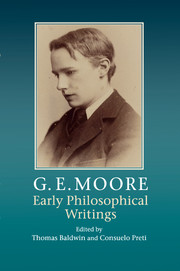Book contents
- Frontmatter
- Contents
- Preface
- Abbreviations and notes
- Editors' introduction
- THE 1897 DISSERTATION: THE METAPHYSICAL BASIS OF ETHICS
- Preface
- Introduction
- Chapter I Freedom
- Appendix: Professor Sidgwick's Hedonism
- EXAMINERS' REPORTS ON THE 1897 DISSERTATION
- THE 1898 DISSERTATION: THE METAPHYSICAL BASIS OF ETHICS
- EXAMINER'S REPORT ON THE 1898 DISSERTATION
- Index
Chapter I - Freedom
Published online by Cambridge University Press: 05 June 2012
- Frontmatter
- Contents
- Preface
- Abbreviations and notes
- Editors' introduction
- THE 1897 DISSERTATION: THE METAPHYSICAL BASIS OF ETHICS
- Preface
- Introduction
- Chapter I Freedom
- Appendix: Professor Sidgwick's Hedonism
- EXAMINERS' REPORTS ON THE 1897 DISSERTATION
- THE 1898 DISSERTATION: THE METAPHYSICAL BASIS OF ETHICS
- EXAMINER'S REPORT ON THE 1898 DISSERTATION
- Index
Summary
KANT A DECLARED DETERMINIST. FREEDOM NOT ‘NATURALLY’ POSSIBLE
In beginning a discussion of Kant's notion of ‘Freedom’, which he himself considers to be essentially connected with his Ethical system, it seems most important to emphasize the fact that, so far as his express statements are concerned, he accepts unconditionally the view of Determinism and rejects that of ‘Freedom’, in the only sense in which the two have been generally discussed by English thinkers. In ordinary controversies on the subject, no such absolute distinction is drawn between two kinds of ‘causality’, two kinds of ‘determination’ (Bestimmung – the sense which is implied in ‘Determinism’), two kinds of ‘possibility’, or finally an ‘intelligible’ and an ‘empirical’ character, as is drawn by Kant. Professor Sidgwick, indeed, puts the question in such a form that Kant's answer would probably have to be on the Libertarian side; but this result seems only to be obtained at the cost of the above-mentioned ambiguity. ‘Is the self’ he says ‘to which I refer my deliberate volitions a self of strictly determinate moral qualities, a definite character partly inherited, partly formed by my past actions and feelings, and by any physical influences that it may have unconsciously received; so that my voluntary action, for good or for evil, is at any moment completely caused by the determinate qualities of this character together with my circumstances, or the external influences acting on me at the moment – including under the latter term my present bodily conditions – or is there always a possibility of my choosing to act in the manner that I now judge to be reasonable and right, whatever my previous actions and experiences may have been?’
- Type
- Chapter
- Information
- G. E. Moore: Early Philosophical Writings , pp. 17 - 86Publisher: Cambridge University PressPrint publication year: 2011
- 1
- Cited by

